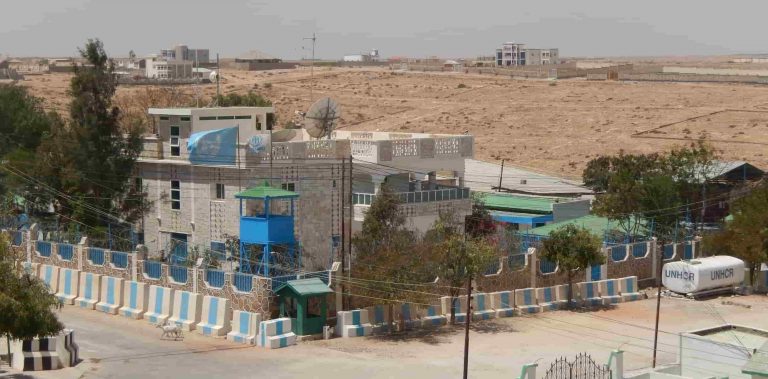 Somaliland. Not Somalia. Somaliland has been an independent region of Somalia proper for more than 20 years. Yet, most Westerners do not associate the former British protectorate with 20 years of independence and stability but rather with the instability and chaos of Mogadishu (which is not part of Somaliland if you did not know).
Somaliland. Not Somalia. Somaliland has been an independent region of Somalia proper for more than 20 years. Yet, most Westerners do not associate the former British protectorate with 20 years of independence and stability but rather with the instability and chaos of Mogadishu (which is not part of Somaliland if you did not know).
As I crossed the Somaliland border by land, I was quickly reminded of the Kurdistan part of Iraq. In similar fashion, Kurdistan is not far from Baghdad but bears little resemblance to the chaos of the Iraqi capital city. Further, Somaliland similarly bears little resemblance to Mogadishu. Rather it looks like Dubai 20 years ago. The construction and economic activity seemed out of place in Dubai 20 years ago, but now it is the norm and the epicenter of the booming Middle Eastern financial sector.
Somaliland: Emerging Economy in the Face of Contradiction

Due to the lack of official recognition internationally, Somaliland still suffers from the international trade
Sitting down with the Somaliland Central Bank Governor Abdi Dirir, you learn quickly how informal the Somaliland economy is. “The GDP of the Somaliland economy is possibly $1.5 billion,” said Mr. Dirir. In response to my speculation that the Somaliland economy could range from $3 to $4 billion, the governor easily replied: “it is possible.” The movement of money throughout the Somaliland economy is a misnomer for modern day economic growth. If you are looking for commercial banks and “visa accepted here” signs, you will be highly disappointed because of the embargo imposed on Somalia. Still, Somalians have made a name for themselves as Africa’s most skilled traders. As keen businessmen working within constrained parameters, Somalians are a driving force in Africa’s informal market.
According to the Governor, the Somalian Schilling maintains a stable exchange rate except for the minor fluctuations that occur when the diaspora visit this territory usually at the same time for a holiday week. During this time, a huge influx of Somalians brings U.S. dollars into the economy, creating a minor boost in the dollar supply. To say informality characterizes this economy would simply be an understatement.
From Traders to Entrepreneurs
Entrepreneurship is the second best characterization of the Somaliland economy. If you ask a local Somalian to introduce you to some local entrepreneurs, he will ask if you are staying for a couple weeks. A short visit will not do the country justice.
Somaliland is a country of more than 20 newspapers, more than 15 universities, and several telecom operators. For a republic that has around 4 million inhabitants, these types of numbers are both impressive and concerning. In the world of media, newspapers come and go as the best ones rise to the top and the defunct ones disappear. As one local Somalian described the situation, one day a guy is a newspaper entrepreneur and the next day he is pitching you on a new agribusiness idea.
In the world of education, starting a new university may seem as easy as a hobby in this country. Yet, in reality, it is an area of opportunity where the local population is starving for increased education. At the same time, it is another manifestation of a growth opportunity for government regulation. As the government begins to implement a quality standard around education, the number of universities should shrink and the quality of graduates should improve. Despite all the challenges in sectors, such as news media and education, optimism must be taken from the current situation.
“Free enterprise is Somalia,” according to the Minister of Planning Dr. Sa’ad Ali Shire, “because the prior circumstances of the country required the private sector to do a lot of work.” The private sector effort in creating modern day Somaliland can never be fully appreciated. “It is the private sector building this country,” added the minister. Calling Somaliland the emerging Silicon Valley for its creativity may be an overstatement today but give it time.
Booming Telecom
The Somaliland telecommunication industry is a beacon of the championed free enterprise system in Somaliland. Six telecom operators populate the bandwidth of the country. Some telecom experts speculate that mobile penetration could be as high as 35 to 40 percent as of January 2013. The number of companies and the accompanying penetration rates are a stark contrast to the estimated 3 to 5 percent penetration rates at the turn of the century. Telesom is the biggest player in the market with more than 85 percent of the mobile subscriber market and the only firm with significant market power. SomTel is the second largest operator with a rapidly growing number of internet users. The presence of multiple operators, despite the imbalance in market share, has made Somaliland one of the cheapest mobile phone environments in the world.
And that’s just one example. Next week we’ll look at the challenges facing the booming telecom industry, and dive into mobile banking, and the import/export business in Somaliland, which is centred around Port Berbera.
